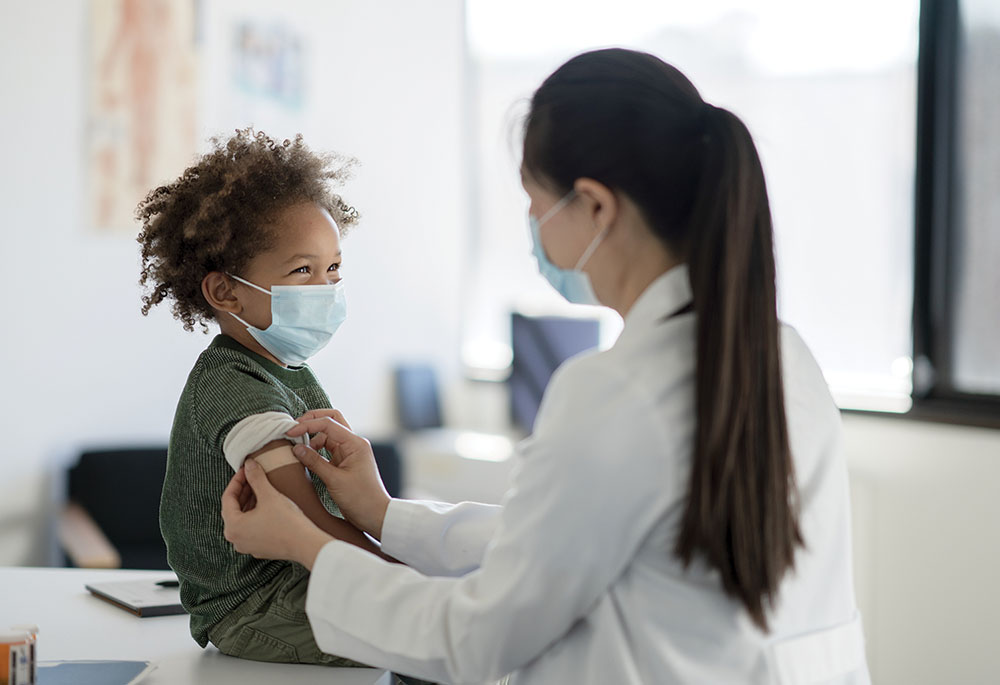
According to the World Health Organization, vaccination prevents 3.5 million to 5 million deaths globally each year. Yet, in recent years the number of unvaccinated children has skyrocketed.
We talked to pediatricians to find out why and to learn how parents can keep their kids safe.
Due to the pandemic, many kids missed their routine vaccinations. Local pediatricians note that it’s critical to preventing the spread of disease and protecting their peers that children get caught up on their missed shots.
“It could get really ugly this year,” says Scott Krugman, vice chair of pediatrics at the Herman & Walter Samuleson Children’s Hospital at Sinai. “The overall numbers (of vaccinated children) have dropped significantly.”
According to Centers for Disease Control (CDC), the number of children receiving their vaccines has dropped by 1 percentage point since the start of the pandemic. Children’s National Hospital in Washington, D.C. also noted a significant declie in vaccination rates among children.
Why are vaccines so important?
“Vaccines reduced major diseases that used to be major problems, and killers in kids,” Krugman says.
“Vaccines help teach the immune system how to recognize and fight off diseases that can harm or kill children. This helps keep children healthy and prevents the spread of vaccine-preventable diseases to others,” says Katie Lockwood, a pediatrician at Children’s Hospital of Philadelphia (CHOP).
Pediatricians also note that vaccinating your child also helps protect children who might not be able to get vaccinated for other health reasons or whose parents chose not to vaccinate them.
“Some of those problems can be found with children who are undergoing chemotherapy for cancer, who are taking immunosuppressant medications for autoimmune diseases, who have rare immunodeficiencies or who have diabetes,” says Dr. Caren Kirschner, a pediatrician at Fox Chase Pediatrics in Philadelphia.
“Another consideration is that children under 1 aren’t routinely vaccinated against measles, mumps, rubella or chicken pox,” which are all required school-age vaccines, she adds.
“Sometimes parents tell me that they think their child’s immune system isn’t strong enough to handle vaccines because they have a chronic health condition like asthma or sickle cell anemia, but these children actually need these vaccines even more to prevent complications from these diseases,” Lockwood says.
You can find an updated list of school vaccination requirements from state health departments through the CDC at cdc.gov/vaccines/imz-managers/awardee-imz-websites.html. Philadelphia also has a local immunization program.
Maryland, Washington, D.C. and Philadelphia all allow parents to opt out of these requirements for religious or medical reasons. Pennsylvania also allows exemptions for personal reasons.
If you aren’t sure vaccines are safe for your child considering their health history, talk to your child’s doctor.
If your child has already had COVID-19 is vaccination still important?
While a COVID-19 vaccine is not required to enter schools this year in Maryland and Pennsylvania, it is required for ages 12 and older in Washington, D.C. State and local officials also recommend it.
While most people have been primarily concerned about older adults getting seriously ill from COVID-19, children aren’t immune to serious illness. COVID-19 was the third to fifth leading cause of death between 2020 and 2021 across most age groups, according to Krugman, and an article published in the Journal of the American Medical Association cites COVID-19 as the fourth leading cause of death for ages 15-24 from January to October in 2021.
“The immune response might protect the child in the future or it might not,” Krugman says. “Children with mild cases may not have a big immune response to the virus and may still be at risk of getting it.”
According to Krugman, for the best protection, children who have had COVID-19 should still get the vaccine. After having COVID-19, you can wait three months after your infection before getting vaccinated, according to the CDC.
For the best protection heading back into the school year, parents should be sure to take their child to get a booster shot about five months after their COVID-19 vaccination, according to Krugman.
Why are vaccination rates dropping?
According to pediatricians, the primary cause for vaccine rates dropping is medical misinformation, aided by the ease of information sharing online.
“There was a lot of opportunity for people to provide misinformation to make parents scared of the vaccine. Once you go down the rabbit hole of vaccine misinformation on the internet for (COVID-19), it’s easy to find that for all vaccines,” Krugman says.
Because people are no longer used to seeing many of the diseases vaccines protect us from, many don’t understand how serious they can be. Krugman says that COVID-19 has exacerbated this issue greatly.
The best place to get information about vaccines, their benefits and any risks is directly from your child’s pediatrician.
“It’s important to share your particular concerns with your healthcare provider so that they can have a meaningful conversation with you that is individualized and builds trust,” Lockwood says.
If your child is anxious about getting a vaccine, understanding why vaccines are important can help them overcome their fears.
For older children, Lockwood recommends a more scientific approach. For younger children, the answer could be as simple as, “to keep us healthy.” Telling your children about your experience getting vaccinated can also help them see it’s not bad or that scary.






